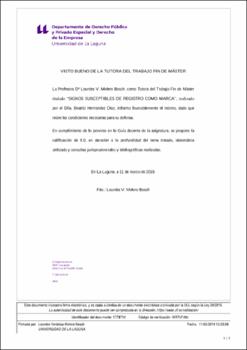Signos susceptibles de registro como marca.
Author
Hernández Díaz, BeatrizDate
2021Abstract
Este trabajo analiza el registro actual de marcas bajo la reciente reforma de la Ley
17/2001, de 7 de diciembre, de Marcas. El registro de ciertas marcas no
convencionales aún entraña grandes dificultades a pesar de la flexibilidad que aporta
la reforma respecto a la “representación gráfica”.
Algunas marcas atípicas como el sonido se asientan como marcas registrables,
mientras que las restantes aún se enfrentan a una amplia problemática derivada
especialmente de la postura jurisprudencial.
El derecho debe ser dinámico para poder adaptarse a las necesidades que van
surgiendo conforme a la sociedad y la realidad cambiante en la que nos encontramos,
por ello el derecho de marcas no puede quedarse atrás.
Numerosos estudios indican que el uso de marcas no convencionales es
imprescindible en el marketing, y la propia psicología económica ha constatado que
las marcas basadas en una determinada percepción sensorial o una apariencia externa
específica captan más la atención del consumidor que las marcas tradicionales.
El análisis de este trabajo se centra no solo en la problemática actual de registro de
marcas, sino en los cambios que ha supuesto el uso de las marcas no convencionales
en las empresas y en la comercialización de productos. This Master's thesis analyzes the current trademark registration under the recent
reform of Law 17/2001, of December 7, of Trademarks. The registration of certain
unconventional brands still entails great difficulties despite the flexibility provided
by the reform regarding "graphic representation".
Some atypical marks such as sound are accepted as registrable marks, while the
remaining ones still face a wide range of problems derived especially from the
jurisprudential position.
The right must be dynamic to be able to adapt to the needs that are arising according
to society and the changing reality in which we find ourselves, therefore the right of
trademarks can not be left behind.
Numerous studies indicate that the use of non-conventional brands is essential in
marketing, and economic psychology itself has found that brands based on a specific
sensory perception or a specific external appearance capture more consumer attention
than traditional brands.
The analysis of this Master's thesis focuses not only on the current problem of
trademark registration, but also on the changes that the use of unconventional brands
in companies and in the commercialization of products has meant.




